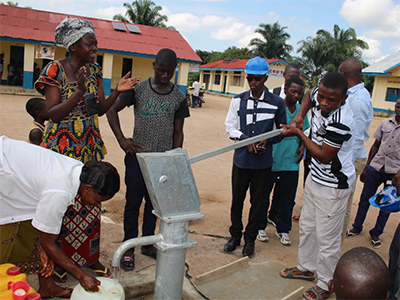The United Methodist Church’s Abundant Health Initiative (Advance#3021770) is committed to reaching a million and more children with life-saving interventions, a goal set for the 2016-2020 quadrennium.
Access to health services is not always simple, says the World Heath Organization.
In Liberia, Mardea was carried for two hours in a hammock, during labor, to deliver her baby at Camphor clinic. In Central Congo, the construction crew at Dingele Maternity Center rushed a woman in labor with complications to the hospital in their truck. In Jalingo, Nigeria, the taxi union has been contracted to transport women with obstetric emergencies to UMC health facilities. In Nicaragua’s autonomous regions, a horse or motorboat are on standby.

But there are so many other places around the world where physical access to health care simply isn’t possible. Tragically, women and children die for lack of transport – a bus, a bicycle, a motorbike, a truck – or the money to pay for the service, the confidence or permission to take it, or, finally, the limitations of staff and services available on arrival at a health clinic.
Affordability is at the heart of the matter for many families. Payment for consultation fees or medicines brings about hardship. They must use rent money, miss meals, walk instead of ride, go into debt or lose a day’s income.
For Bhawana, affordability meant a walk of several hours with her husband and mother-in-law in the hills of Western Nepal. She had gone into labor and needed to reach her clinic as quickly as possible. On arrival, the examining nurse found complications that she was not equipped to help with and immediately referred the family to the district hospital. How would they pay for the transport and hospital fees?
It seemed an impossible and life-threatening situation until they realized they qualified, on the spot, for an interest-free loan from a fund created for such emergencies. This fund was initiated through a Global Health grant and, after discussion and agreement, received equal and ongoing contributions from the community and local government.
True health coverage is access to health care providers themselves and to quality care offered with dignity in clean facilities. Many women from lower social classes or those simply lacking resources have given birth in poorly equipped and staffed facilities without basic infrastructure, like water or a decent delivery bed, because of years of neglect.
Justice for these women has been realized through the UMC-supported revitalization of their health facilities to provide maternal, newborn and child health care, among other essential services. Delivery rooms are equipped and medications are available. Health care workers in UMC health facilities are trained to provide care with dignity, regardless of the individual’s background. In Ghana, pregnant women and patients prefer to travel for miles to access the Methodist Health Facilities: "We prefer to come to the Methodist clinic" they say "because God is there." God is there through the compassion, love and the quality care they receive.
At the heart of The United Methodist Church’s Abundant Health Initiative is the desire to bring the best possible health services with the best possible outcomes to communities, and especially to women and children. Reaching them is an issue of Christian care and justice.
excerpt from a story by Kathy Griffith, Global Health team lead and program manager for Maternal, Newborn and Child Health.
The Advance is the accountable, designated-giving arm of The United Methodist Church. The Advance invites contributors to designate support for projects related to the General Board of Global Ministries. Individuals, local churches, organizations, districts and annual conferences may donate to The Advance. One hundred percent of every gift to The Advance goes to the project selected by the giver. Gifts to missionaries support the entire missionary community.





